
A Time for Heroics
October 21st, 2014
“Any nation that does not honor its heroes will not long endure” is an oft-quoted remark attributed to Abraham Lincoln (although these may not have been his exact words). Nevertheless, Jamaicans take the spirit of these words to heart, as do other countries in the hemisphere and around the world.
This week is National Heroes Week in Jamaica. It’s a time when Jamaicans take a quick breather. School is on half-term, and working people take a day or two off. The Governor General does his annual ritual of presenting awards and honors to deserving Jamaican citizens, sitting all dressed up under a heat-trapping tent at King’s House. And then, after this week, we all start thinking about Christmas.
Among those at King’s House today was eleven-year-old Toni-Ann Miller, who ended up saving the lives of two small children trapped in a burning house, on an ordinary day, on her way home from school in St. Catherine. Today she received a Badge of Honour for Gallantry for her actions last year (Gallantry! What a wonderful, old-fashioned word that is!) When asked why she did it, she simply said because she had seen her father rescue several members of their family from a fire the year before.
Which brings me to some thoughts about bravery, and heroism. I guess we can divide our National Heroes into those who were physically courageous – such as Sam Sharpe and Paul Bogle – and those who had the mental audacity and determination to create a new Jamaica, such as the founders of our two political parties, Sir Alexander Bustamante and Norman Manley. The latter really come in the “Founding Fathers” category, don’t they? As for our beloved Nanny – a “token woman,” perhaps – I am never quite sure whether the stories about her are true; but they paint a vivid and inspiring picture of resistance to the colonial masters, so perhaps it doesn’t matter very much.
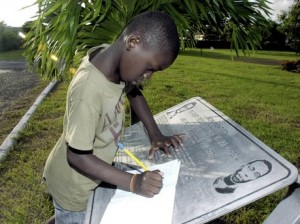
Akeem Williams, a nine-year-old student of Clan Carty Primary School in Kingston, is busy taking notes on Jamaica’s national heroes during the Salute to Heroes at the National Heroes Park in 2010. (Photo: Norman Grindley/Gleaner).
Jamaican children grow up with the National Heroes. They are family. Their faces adorn the walls of almost every school in the country (usually the same images all the time, although there is still some doubt about whether our photographic image of Paul Bogle is authentic). But I wondered how many other countries – in the region and beyond – have National Heroes, and if so, what do they have in common with our impressive array of rebels and revolutionaries?
In the Americas, many of these heroes are Founding Fathers – great historic political and/or military leaders, one should say. We love our National Heroes in the English-speaking Caribbean. Barbados has ten (again with one “heroine” only) – mostly politicians or public figures and a cricketer. Antigua has five (including the token woman) and a cricketer. It is about to name its sixth National Hero (former Prime Minister Lester Bird). Interestingly, the Bahamas is only just getting around to the idea of national heroes; last year, October 14, 2013, was their very first National Heroes Day. They see it as a way of reclaiming their history and enhancing national unity.
Let’s not forget our neighbors in Haiti, and the towering figure of Toussaint Louverture (“the Black Napoleon”), leader of the Haitian Revolution and the architect of the country’s Independence back in the eighteenth century. If no one else qualifies as a true National Hero, this man does – a man of his times, but a true revolutionary, who succeeded in freeing the Haitian people from slavery. What energy he must have had! After Toussaint died, sadly, in a French prison, Jean-Jacques Dessalines, also born a slave and also regarded as a founding father, carried on his great work and became the first leader of an independent Haiti.
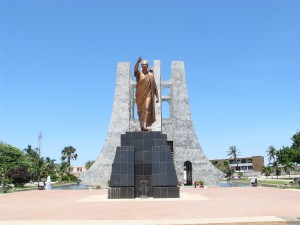
Dr. Kwame Nkrumah (1909 – 1972), the first President of Ghana, is now buried in this mausoleum in a Memorial Park in Accra. It is his third – and hopefully, last – resting place.
In Africa (as elsewhere), national heroes can be controversial – even their final resting place is sometimes in dispute. There was quite a fuss over the reinterment of Ghana’s founding president, Osagyefo Dr. Kwame Nkrumah. We have our beautifully landscaped National Heroes Park, where at least we can lay wreaths and so on, so that solves the problem; South Africa has a Heroes Arcade, which also works. There has to be a proper space for our heroes, I think. Monuments are important (that’s one thing I adore about Washington, DC – I could hang around with Mr. Jefferson and Mr. Lincoln all day long).
During a recent tour of King’s House, I came upon a splendid bust of a man in dashing military uniform. We were told that this was a gift from the Chilean Government – their Independence hero, Bernardo O’Higgins (that must be the best name for a National Hero, anywhere – he did have Irish ancestry, actually).
Poor Mr. O’Higgins got moved around several times after his death, too. Of course, politics came into play. I hope he has found his final resting place, now. I do hope also that Simón Bolívar will be allowed to rest in peace, after being unceremoniously dug up by the late Venezuelan president Hugo Chávez in 2010 to determine whether, in fact, he had been poisoned by the dastardly Colombians. Bolívar is claimed as a hero by several South American nations, and has a country named after him. He is a South American hero to end all heroes.
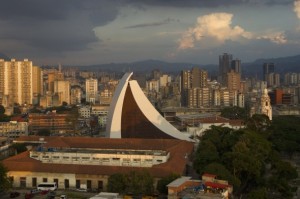
Simon Bolivar’s final resting place in Caracas: A mausoleum that some have unkindly compared to a skateboard ramp. (Photo: Reuters)
But have you noticed how these national heroes are often reinvented, romanticized and reworked, to suit the politics of the day? “El Libertador” (as Bolívar is known), whom Mr. Chávez named his Republic after, actually thought the American political system was “the best on earth” – not quite in keeping with Chávez’ socialist beliefs. Have we been true to our heroes in Jamaica, or have we been tempted to revise them a little? They are a little one-dimensional; but I think yes, they are who they are, not what some politician wants them to be.
In terms of sheer numbers, however, none of us in the Americas could compete with Indonesia, (which, incidentally, just swore in its new Obama-style president last Sunday). Indonesia has an astonishing 156 National Heroes! Only twelve of these are women. Many are anti-colonial freedom fighters, and some quite controversial depending on the politics of the day. There are even three husband-and-wife national heroes. Former dictator Suharto has been nominated for years but still hasn’t made it to the list. I understand that most Indonesians don’t really know much about most of their heroes; there are just too many. But then, Indonesia is the world’s fourth most populous country (252 million) and we are barely at three million. They probably need a lot more to work with.
So what makes a hero – well, heroic?
I am sure that all our National Heroes, getting up each and every day, opening their eyes to the sun’s first rays shining on their island, had to “screw their courage to the sticking place” – to quote Shakespeare’s Lady Macbeth. That’s not an easy thing to do.
And perhaps that is the true essence of heroism. Just getting up and getting on with it, over and over, every day. That really takes guts.
Tags: Abraham Lincoln, Africa, Alexander Bustamante, Antigua, Bahamas, Barbados, Bernardo O'Higgins, Chile, Ghana, Haiti, Hugo Chavez, Indonesia, Jamaica, Jean-Jacques Dessalines, King's House, Kwame Nkrumah, National Heroes, Norman Manley, Paul Bogle, Sam Sharpe, Simon Bolivar, South Africa, Toussaint Louverture, Venezuela, Washington DC
The Gleaner reserves the right not to publish comments that may be deemed libelous, derogatory or indecent.
To respond to The Gleaner please use the feedback form.
5 Responses to “A Time for Heroics”
- We Are the Zoomers
- Living Online with Humans and Birds: NAOC 2020
- Human Trafficking and the Problem of Public Education
- Down Memory Lane
- Are We Ready to Recover from COVID-19?
- Road Safety Matters: Is Your Vehicle Safe?
- Sexual Harassment, Me Too, and the Minister’s Disturbing Giggle
- The Vulnerable Senior Citizens, Private Care Homes and COVID-19
- A Muddle Over Masks
- Here is Something Life-Saving You Can Do: Give Blood!

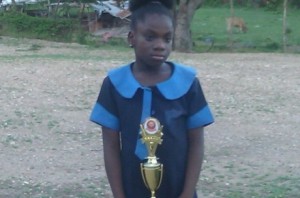
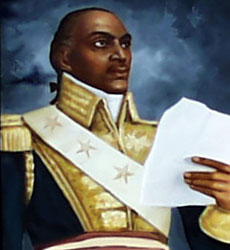
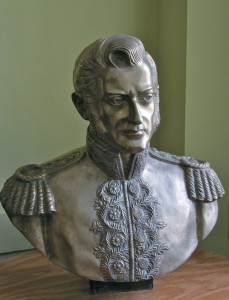


I agree with you that Manley and Busta are more Founding Fathers than ‘Heroes’ as their work led to divisiveness and disunity of our people, a central reason for our inability to achieve the work the other Heroes fought for.
Yes, Barbara – that is the problem. If you look at political leaders in other countries who were made national heroes, you find the same discomfort.
I think that is an issue. Perhaps national heroes should be “apolitical”? After all, they should really inspire national unity, shouldn’t they…
Excellent point regarding the malleability of the concept of “national heroism,” and the ease with which past heroes or founders can be appropriated to suit the political exigencies of present-day political actors. In the U.S., as you note, we certainly have our panoply of national heroes (which in recent years has expanded to embrace individuals such as Bayard Rustin, Harvey Milk, César Chávez, Dorothy Day, Betty Friedan and others in the non-white/male/straight/cisgendered category), though even today right-wing Republicans often refer to the “Founding Fathers” to justify anything from loosening gun regulations to tax cuts for the wealthy to combating civil rights legislation.
The very concept of heroism in a national context is problematic enough, and can, as you note, function as a spur to national pride and unity, on the one hand, or lead to mythologizing and hagiography on the other. The role of secular saint can be every bit as divisive as that played by the Vatican-issue ones. George Washington and Thomas Jefferson owned slaves, after all. Even my personal hero — Rev. Dr. Martin Luther King, Jr. — is widely believed to have carried on numerous extramarital affairs.
In the end, though, Emma, I think you get it exactly right in your closing — the true heroes in any nation are the women and men who get up each day and just do what they have to do.
[…] Oh, a lot has been happening on this modest-sized island of ours. It’s not been an easy week, and it’s National Heroes Week. Please read my thoughts on heroes, at home and abroad, on my weekly Gleaner blog page, Social Impact. Comments on the page are more than welcome! http://gleanerblogs.com/socialimpact/?p=2278A […]
Thank you for your comments, Benji. Yes, malleability is just the right word! Of course there are many “new” heroes in the U.S. as well aren’t there, reflecting the increasing diversity of society. Perhaps the religious saints are in fact less controversial and divisive than our secular ones, these days! No one is perfect and they all have skeletons in their cupboards, but as I noted – it’s that inner “hard core” of determination that really counts for me, in a hero… Thank you so much for your kind comments and look forward to hearing from you again.